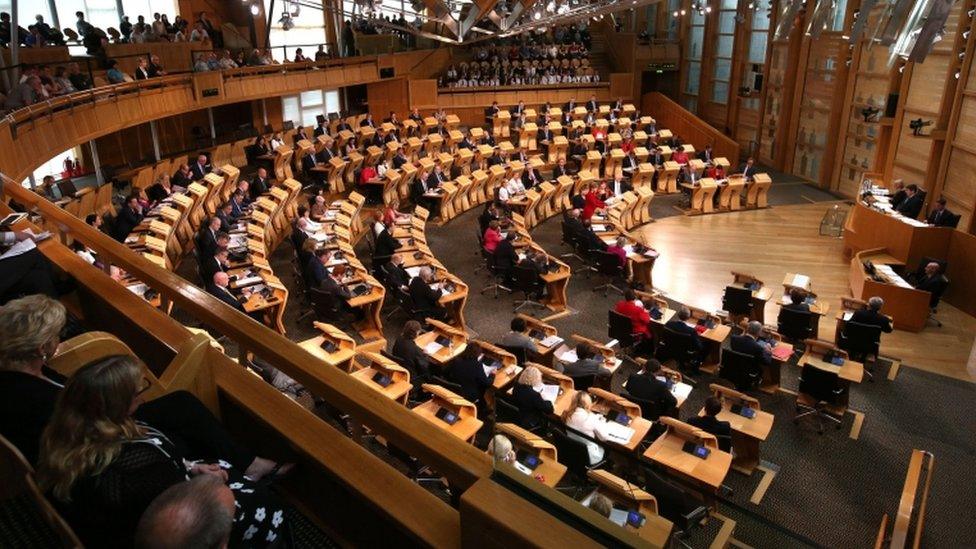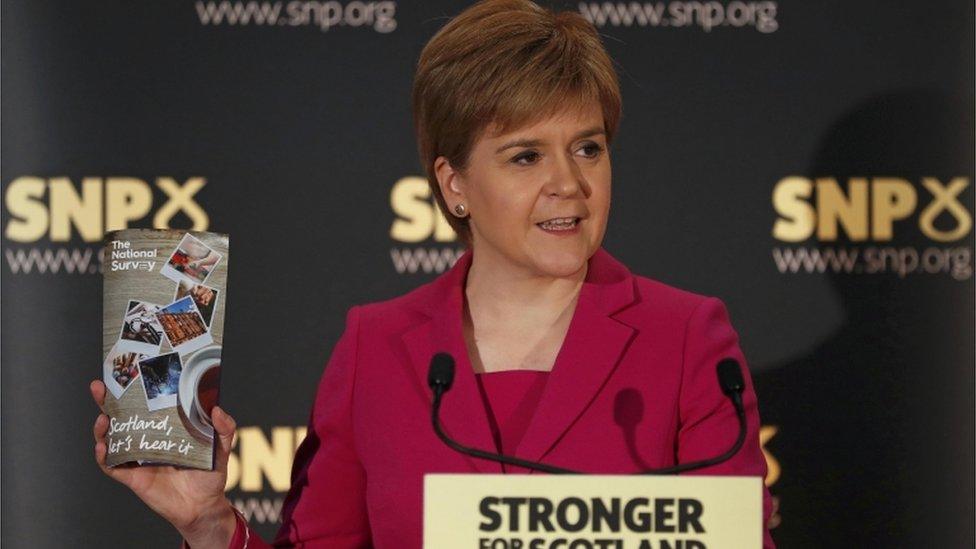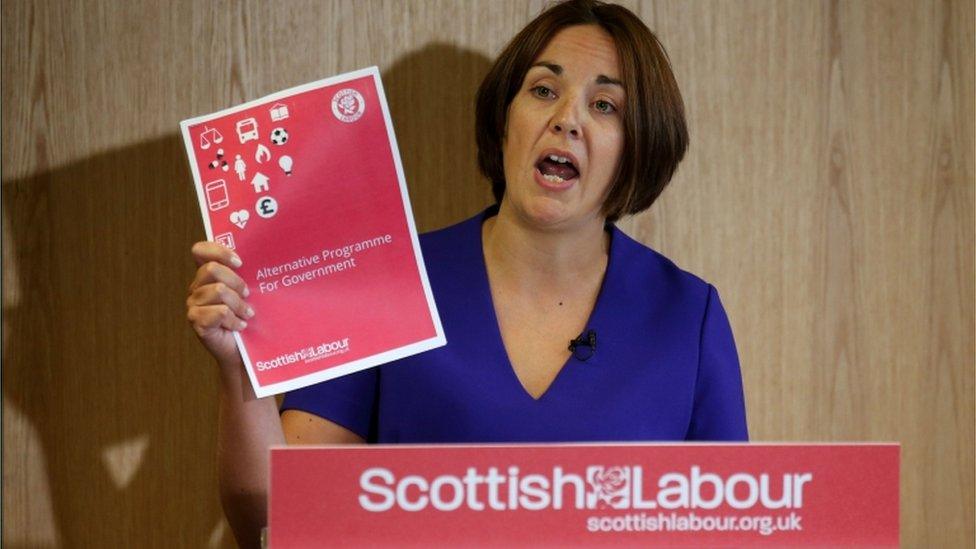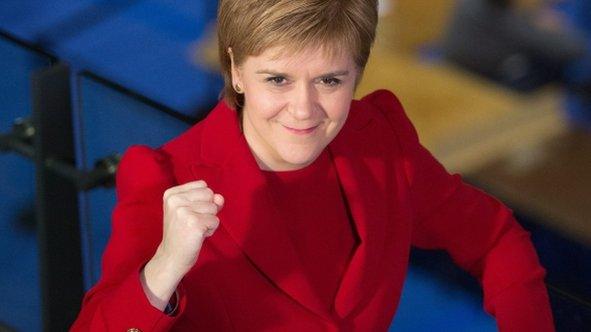Nicola Sturgeon unveils £500m business fund
- Published
Ms Sturgeon said the move was an "exceptional response to an exceptional economic challenge".
Nicola Sturgeon has unveiled a £500m fund to help Scottish businesses as she set out her government's plans for the next year, external.
Ms Sturgeon told MSPs at Holyrood that the move was an "exceptional response to an exceptional economic challenge".
She also insisted that education was the "defining mission" of the Scottish government.
Proposals to help close the attainment gap were among the 14 bills the Scottish government will introduce.
The plans include a Child Poverty Bill, which Ms Sturgeon said was arguably the government's most important legislation.
The bill would establish Scotland as the only part of the UK with statutory income targets on child poverty, and see a "baby box" given to every newborn.
But much of Ms Sturgeon's focus was on boosting the economy in the wake of the Brexit vote, with the first minister promising £4bn will be spent on infrastructure next year alongside the £500m Scottish Growth Scheme package of support for private businesses.
Ms Sturgeon said the growth scheme would offer individual investment guarantees, and some loans, of up to £5m to small and medium sized firms who would otherwise be unable to grow because of a lack of investment finance.
As financial guarantees, the support will not come from existing spending plans, and will instead see the Scottish government share some of the risk faced by small companies, when they make big investment decisions.
The first minister described the fund as a "half-billion pound vote of confidence in Scottish business, Scottish workers and the Scottish economy".
Ruth Davidson: 'The SNP cupboard is bare'
Ms Sturgeon's SNP formed a minority government after winning 63 seats in May's Scottish Parliament elections.
She told MSPS that Holyrood was operating in a "new political, economic and constitutional context" following the UK voting to leave the EU.
The first minister said the Scottish government would use its newly devolved powers over tax and welfare to adapt to those changes.
Ms Sturgeon has already ordered ministers to start drawing up legislation for a second independence referendum, which she said is "highly likely" - although not inevitable - following the Brexit vote.
Ms Sturgeon told MSPs that the Scottish government would consult on the draft referendum bill in case an independence referendum was the "best or only" way to protect Scottish interests - sparking groans and laughter from opposition politicians.
They have called on the Scottish government to "focus on the day job" of improving public services instead of pushing for independence.

Analysis by Brian Taylor, BBC Scotland political editor
It was, we were assured, a programme for different - and troubled - times. Hence a renewed emphasis on bolstering economic growth alongside the priority accorded to education.
Not, to be clear, that the economy has ever been far from ministers' minds. However, Nicola Sturgeon's narrative is that Brexit will add considerably to the challenges facing Scotland and the UK. Requiring additional support.
But, even in these post referendum days (EU, that is, not the 2014 version), there is still scope for a few familiar notes.
And so Ms Sturgeon lambasted the Tories, characterising them as the right-wing enemies of her social democratic programme.
Ruth Davidson, who leads said rightist cabal, smiled benignly from her new elevated status as the principal opposition party, accusing Ms Sturgeon of preparing to hike Scottish tax by failing to pass on UK Treasury concessions to higher rate payers.

Ms Sturgeon said four of her government's bills would focus on some of the new powers that have been devolved to Scotland, with proposals to cut Air Passenger Duty, incorporate British Transport Police in Scotland into Police Scotland, and to promote gender equality on public boards.
The fourth bill would set out proposals for a Scottish welfare system based on "dignity and respect", the first minister said, with the SNP having already pledged to increase carer's allowance and create a new grant for low-income parents.
Among the government's other plans are:
doubling the amount of free care available to all three and four year olds and the most disadvantaged two year olds to 1,140 hours a year
allocating an additional £750m to help close the education attainment gap, including £100m going directly to schools
a pledge that the health resource budget will be at least £500m more than inflation
A Domestic Abuse Bill to prevent and eradicate violence against women and children
Warm Homes and Climate Change legislation and fresh legislation on land reform
Ms Sturgeon said education was the "defining mission of my government", and that she was aiming for "truly transformational investment" in childcare.
She added: "I have said that I want to be judged on our success in narrowing and ultimately closing the attainment gap.
"We must not tolerate a situation where some children from deprived areas do less well at school than those from affluent areas.
"The measures we will implement over the next five years constitute a comprehensive approach to tackling that".

What have opposition parties said?

Responding to Ms Sturgeon's proposals, Scottish Conservative leader Ruth Davidson urged the first minister to ditch the "threat" of a second referendum and focus on governance, adding that she was disappointed by the SNP's "failure to listen" on the economy.
Energy is being "diverted into an endless political campaign", she said, with Ms Sturgeon's list of legislation serving as "a warm-up act to nudge the independence caravan another few inches along the road".
"I do not subscribe to the view that we are helpless to act in the face of Brexit - nor do I think that breaking up a union worth four times more to Scotland than the EU is going to help matters very much," she said.
"I said two weeks ago I wanted a new type of Scottish government and what I mean is one which no longer asks - how will this boost independence? But one that asks - how are we growing the country?"
Scottish Labour leader Kezia Dugdale said the programme lacked ambition and failed to address the "big questions" Scotland faces in areas such as public services and jobs.
She added: "Over the past decade, this parliament has become more and more powerful, but the government's programme has become less and less ambitious.
"The first minister and the SNP have had nearly a decade. They now have another five years.
"Let this be five years where focusing on jobs, public services and our economy rank as highly as the SNP's fight for independence."
Scottish Greens co-convenor Patrick Harvie reminded the first minister that she was leading a minority government, and that there would need to be compromise and open-minded discussion in order for its legislative programme to be passed by Holyrood.
He said the new challenges brought by Brexit were against a backdrop of pre-existing challenges, and that there had not been enough progress made in working towards a "fairer, more equal and healthier society".
Scottish Liberal Democrat leader Willie Rennie said: "Nine years after they came to power there is no sign of the SNP are willing to drop independence and get on with the job of making our economy and services the best again.
"The first minister spent the whole summer talking up the prospect of a second independence referendum instead of getting on with the day job."
- Published2 September 2016

- Published1 September 2016

- Published6 May 2016
